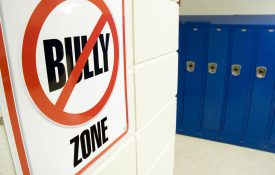-
Will Work For . . . Well, That Depends.
It’s going to be a gloomy Labor Day for many this year. The national unemployment rate, now 9.1 percent, won’t seem to budge, and many states are doing worse than that. The unemployment rate in California exceeds 12 percent, with some communities registering staggering rates of more than 30 percent. Yet jobs go begging. I see jobs advertised in store windows of my hometown, Washington, DC, where one in ten workers is out of work. Many working Americans find this perplexing. Isn’t it simple economics that the unemployed would take these jobs—indeed welcome any job—when times are rough?
-

Back-to-school dilemma: Why do bullies bully?
Long thought to result from fragile self-esteem, bullying may instead stem from grandiose, inflated, and narcissistic self-assessment, some psychological scientists argue.
-
From Lab to Court: Memory and the Law
The New Jersey Supreme Court this week released radical new rules on the use and misuse of eyewitness testimony. The ruling has profound legal implications, essentially challenging the 34-year-old U.S. Supreme Court standard for the reliability of eyewitness memories of crimes, making it much easier for defendants to dispute eyewitness evidence in court. The New Jersey Court is considered a trailblazer in criminal law, and the ruling could well end up re-shaping the law of the land. The ruling also reflects decades of scientific research on human memory, and its failings.
-
Inside the Mind of a Creationist
Texas governor and Presidential candidate Rick Perry is ambivalent about the “theory” of evolution. He says that it’s just a one theory that’s out there, on equal footing with creationism. He’s proud of the fact that, in Texas, children are taught both—so they can choose for themselves. There’s a serious problem with this approach to education, however. It has to do with humans' very limited ability to weigh probabilities rationally. Calculating likelihoods and odds is tough cognitive work, and we only do it when we must. Years of research on human thinking has shown this.
-
A Bias Against Creativity?
Vincent Van Gogh may be the most famous unappreciated artist of all time. Indeed, he was a failed painter, selling only two of his more than 2000 works during his lifetime. Yet his vibrant post-Impressionist style would influence generations of painters to come, and nowadays few would dispute his creative genius. His Portrait of Dr. Gachet sold some years ago for $82.5 million. Van Gogh is in good company. El Greco was scorned by critics, and Johannes Vermeer died in obscurity. Similarly, the writers Henry David Thoreau, Edgar Allan Poe and Franz Kafka—all innovators—received little in the way of honors or recognition in their own eras. This is a puzzle.
-
Heat Wave Psychology
Much of the eastern U.S. is gripped in a heat wave right now, with some predictable effects on mood and behavior—or at least our perceptions of others’ moods and behavior. Normally congenial folks seem to be simmering, while others are on a slow burn. Hotter heads are steaming, and a few have even been pushed to the boiling point. What is it with all these heat metaphors? The fact is our metaphorical thermometer is as much a gauge of our social interactions as an actual thermometer is of degrees Fahrenheit. At least that’s an emerging theory, which psychologists have been exploring in various ways in the laboratory. Here’s an example, from Hans IJzerman and Gun Semin of Utrecht University.

